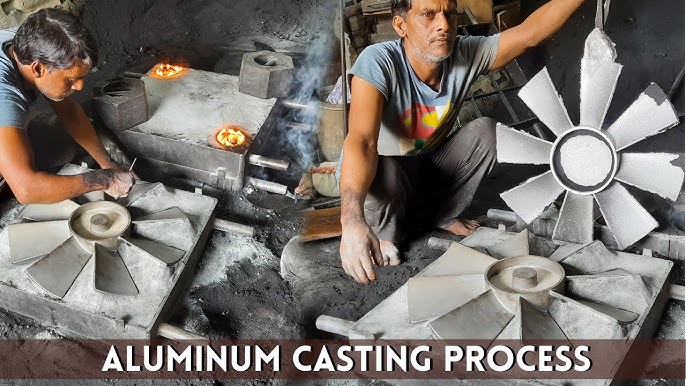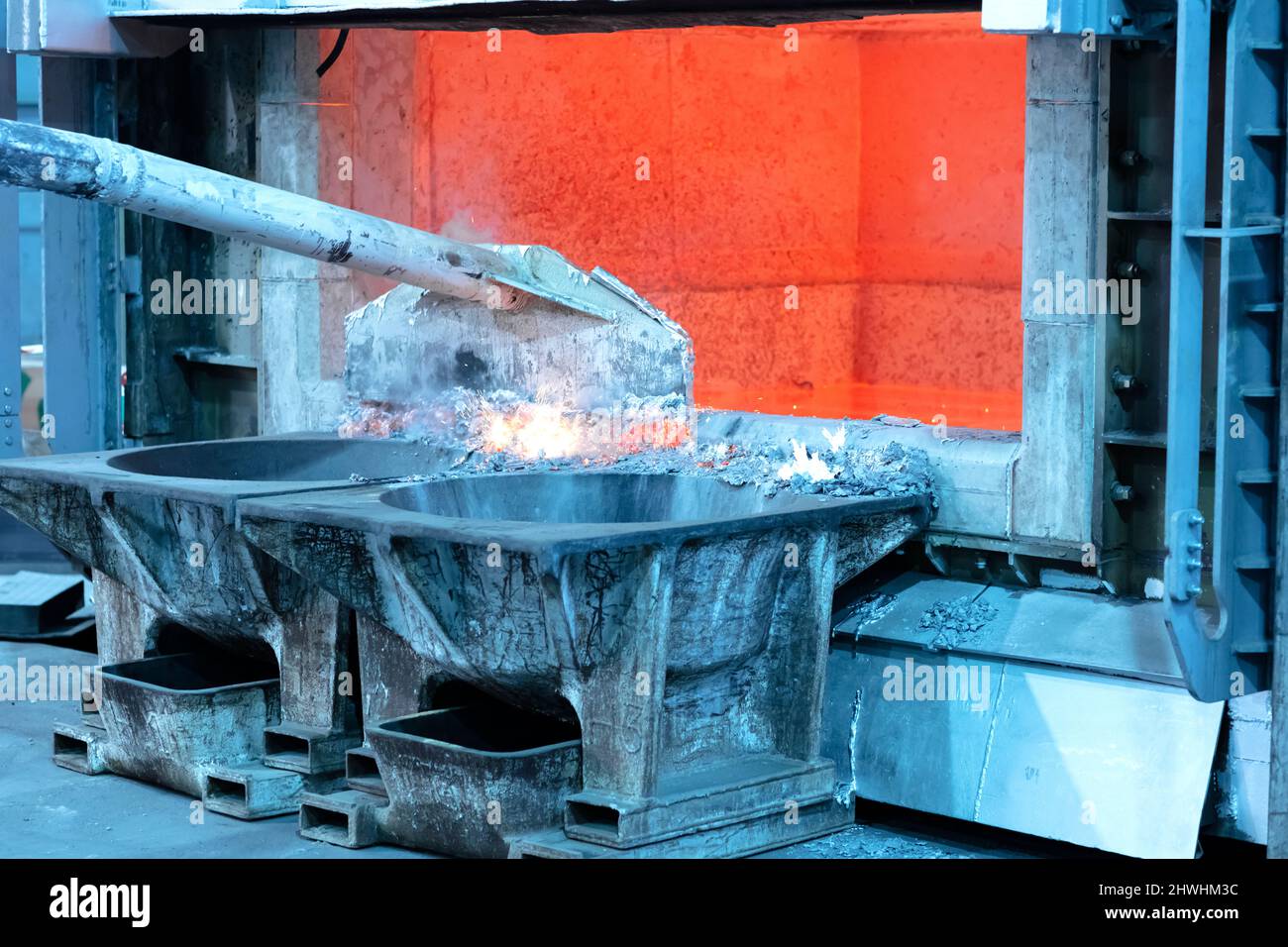Understanding the Perks and Innovations in the Aluminum Foundry Sector
The Aluminum Foundry market plays a necessary role in modern manufacturing. Its lightweight homes especially boost gas efficiency, specifically in aerospace and vehicle industries. On top of that, Aluminum's resistance to deterioration assurances long life in different applications. As the market advances, innovations such as innovative recycling and additive production are reshaping production techniques. Checking out these improvements reveals not only the benefits but also the challenges ahead for Aluminum factories in a rapidly transforming market.
The Lightweight Advantage of Aluminum
Aluminum's light-weight nature uses substantial benefits throughout different industries, especially in manufacturing and transportation. Its reduced density enables for the manufacturing of parts that are easier to mount and take care of, causing decreased labor expenses and improved effectiveness. In the auto sector, lighter lorries add to enhanced gas economic climate and lower exhausts, straightening with international sustainability goals. Similarly, in aerospace, the usage of Aluminum decreases the general weight of airplane, which is essential for boosting efficiency and lowering functional prices.
Additionally, Aluminum's light-weight homes assist in cutting-edge styles that were previously impractical with much heavier materials. This flexibility makes it possible for makers to create complex forms and structures while preserving structural honesty. On the whole, the light-weight advantage of Aluminum not just enhances product efficiency but additionally drives innovations in innovation and layout, making it a preferred material in various applications.
Deterioration Resistance and Resilience
The Aluminum Foundry sector is renowned for creating products with superior rust resistance, making them ideal for different applications. This home, incorporated with improved structural stability, adds to the long-lasting efficiency benefits that Aluminum parts supply. Therefore, industries increasingly depend on Aluminum to meet demanding environmental problems without jeopardizing top quality.
Superior Corrosion Resistance
While different steels face significant challenges from environmental variables, Aluminum stands out for its premium corrosion resistance, making it a favored option in numerous applications. This building is mainly because of a natural oxide layer that bases on the Aluminum surface, giving a barrier against wetness and corrosive representatives. Unlike other steels that might rust or deteriorate gradually, Aluminum preserves its integrity even in rough environments, such as industrial settings or coastal areas. Furthermore, its light-weight nature incorporated with rust resistance makes it optimal for applications in aerospace, automotive, and marine sectors. In general, Aluminum's phenomenal durability not only boosts product long life yet additionally lowers upkeep expenses, presenting an engaging benefit for manufacturers and customers alike.
Enhanced Architectural Honesty
Developers and designers significantly recognize the relevance of enhanced architectural integrity in modern-day applications, where both deterioration resistance and sturdiness are crucial. Aluminum alloys, recognized for their light-weight homes, likewise exhibit exceptional resistance to corrosion, making them appropriate for extreme atmospheres. The ingenious methods utilized in the Aluminum Foundry market add considerably to generating components with improved longevity. Advanced casting processes and alloy make-ups are tailored to meet certain efficiency requirements, ensuring that frameworks can withstand extreme problems without compromising stability. Surface treatments and coatings improve the lifespan of Aluminum items, additionally alleviating degeneration over time. This focus on boosted structural stability not only extends the use of products yet additionally decreases maintenance costs, solidifying Aluminum's setting as a material of option in different sectors.
Lasting Efficiency Conveniences
Lasting efficiency in Aluminum components is mostly credited to their exceptional rust resistance and resilience. Unlike lots of steels, Aluminum naturally forms a safety oxide layer, which protects against corrosion and wear and tear in numerous settings, consisting of aquatic and industrial settings. This inherent residential or commercial property significantly expands the life expectancy of Aluminum products, reducing upkeep and replacement expenses. Additionally, the light-weight nature of Aluminum improves its applicability throughout sectors without endangering stamina. The product's resistance to use and tear also adds to its dependability in demanding applications, making it a suitable selection for automobile, aerospace, and building and construction markets. As sectors increasingly prioritize sustainability and durability, Aluminum's performance advantages align with modern-day design requirements, solidifying its role in ingenious production procedures.
Environmental Influence and Sustainability
 As the Aluminum Foundry industry evolves, it increasingly focuses on environmental impact and sustainability, recognizing the demand for liable methods when faced with environment change. Efforts to decrease waste and power consumption are at the leading edge, with lots of foundries adopting recycling efforts to reclaim Aluminum scrap. This not just minimizes basic material use but also especially reduces power expenditure, as recycled Aluminum needs only a fraction of the power contrasted to main manufacturing.
As the Aluminum Foundry industry evolves, it increasingly focuses on environmental impact and sustainability, recognizing the demand for liable methods when faced with environment change. Efforts to decrease waste and power consumption are at the leading edge, with lots of foundries adopting recycling efforts to reclaim Aluminum scrap. This not just minimizes basic material use but also especially reduces power expenditure, as recycled Aluminum needs only a fraction of the power contrasted to main manufacturing.Furthermore, improvements in discharges regulate technologies are being executed to decrease air contaminants, aligning procedures with more stringent environmental regulations. Foundries are additionally discovering alternative power resources, such as solar and wind, to power their facilities sustainably. By promoting collaboration with stakeholders, the market aims to establish cutting-edge options that boost eco-friendly stewardship. Collectively, these efforts highlight a dedication to lowering the Aluminum Foundry's carbon impact while advertising a round economy within the production market.
Advanced Manufacturing Techniques
 Reinventing manufacturing procedures, the Aluminum Foundry sector is increasingly incorporating advanced manufacturing methods to improve performance and accuracy. Strategies such as computer numerical control (CNC) machining and additive production have actually become crucial components in maximizing production process. CNC machining permits high-precision element manufacture, greatly lowering product waste and manufacturing time. Additive manufacturing opens brand-new opportunities for intricate geometries and lightweight designs that were previously difficult to attain.
Reinventing manufacturing procedures, the Aluminum Foundry sector is increasingly incorporating advanced manufacturing methods to improve performance and accuracy. Strategies such as computer numerical control (CNC) machining and additive production have actually become crucial components in maximizing production process. CNC machining permits high-precision element manufacture, greatly lowering product waste and manufacturing time. Additive manufacturing opens brand-new opportunities for intricate geometries and lightweight designs that were previously difficult to attain.Furthermore, the release of automation and robotics in Aluminum shops simplifies procedures, reduces human error, and improves worker safety. These technologies promote a more receptive manufacturing setting, making it possible for suppliers to adapt swiftly to market needs. The combination of advanced simulation software application additionally boosts the design and testing stages, causing premium item top quality. Jointly, these techniques not just enhance functional performance yet likewise foster advancement, placing the Aluminum Foundry industry at the leading edge of modern manufacturing.
Innovations in Recycling Processes
The Aluminum Foundry market is not only progressing in making methods yet is also making significant strides in recycling More Help procedures. Innovations are emerging to enhance the efficiency of recycling approaches, reducing power usage and boosting sustainability. Advanced arranging innovations, such as automatic optical sorting, enable the recognition and splitting up of Aluminum from other materials with high precision. This causes a greater top quality of recycled Aluminum, which is necessary for preserving the honesty of the end products.
In addition, closed-loop recycling systems are being implemented, permitting suppliers to go to this web-site reuse Aluminum scrap within their very own production procedures. This lessens waste and advertises a circular economic climate. Additionally, research into brand-new recycling strategies, such as hydrometallurgical processes, uses the potential for recuperating Aluminum from intricate waste streams. These innovations not only add to lowering the carbon impact of the Aluminum Foundry industry however likewise strengthen its financial practicality in an increasingly eco conscious market.
Applications Throughout Various Industries
Countless markets are significantly identifying the versatility and advantages of Aluminum Foundry items, causing extensive applications throughout markets such as automobile, aerospace, consumer, and construction goods. In the automotive market, Aluminum castings add to light-weight lorry styles, enhancing fuel effectiveness and performance. Aerospace makers use Aluminum elements for their strength-to-weight proportion, crucial for airplane frameworks and elements.
In building and construction, Aluminum is favored for its toughness and resistance to rust, making it suitable for window structures, roofing, and structural supports. Durable goods likewise gain from Aluminum Foundry products, as seen in kitchenware, electronics, and packaging, where light-weight and recyclable products are vital.
The flexibility of Aluminum Foundry techniques enables complex styles and precise requirements, satisfying the diverse requirements of these sectors. Because of this, Aluminum Foundry items are becoming indispensable to modern-day manufacturing processes throughout numerous sectors.
Future Patterns in Aluminum Foundries
As industries continue to progress, Aluminum shops are positioned to welcome numerous key trends that guarantee to improve efficiency and sustainability. One noticeable trend is the raising fostering of electronic technologies, consisting of automation and fabricated intelligence, which improve procedures and improve quality assurance. Additionally, the push in the direction of sustainable methods is leading foundries to buy reusing innovations, significantly decreasing waste and power consumption.
 An additional emerging pattern is making use of advanced alloys and products, accommodating the growing demand for light-weight and resilient components across different fields (Aluminum Foundry). The assimilation of additive production strategies is prepared for to transform component layout, supplying modification and minimizing lead times.
An additional emerging pattern is making use of advanced alloys and products, accommodating the growing demand for light-weight and resilient components across different fields (Aluminum Foundry). The assimilation of additive production strategies is prepared for to transform component layout, supplying modification and minimizing lead times.Partnership with study organizations is additionally expected to drive advancement, as foundries seek to develop new procedures and materials. Aluminum Foundry. Jointly, these fads suggest a transformative future for the Aluminum Foundry sector, lining up with broader objectives of sustainability and effectiveness
Frequently Asked Questions
What Are the Typical Prices Related To Aluminum Foundry Production?
The regular costs related to Aluminum Foundry production consist of basic materials, labor, energy, tools upkeep, and overhead expenses. These factors jointly influence the overall economic investment needed for effective Aluminum casting procedures.
Just How Does Aluminum Contrast to Other Steels in Toughness?
Aluminum, while lighter than lots of steels, displays impressive strength-to-weight ratios. Contrasted to steel, Aluminum is less strong yet uses exceptional corrosion resistance, making it a favorable option in applications where weight and sturdiness are essential.
What Safety and security Steps Are in Location in Aluminum Foundries?
Safety measures in Aluminum shops generally consist of required individual protective equipment, air flow systems to regulate fumes, normal tools maintenance, training programs for employees, and adherence to strict safety guidelines to reduce risks connected with molten metal handling.
Just How Is Quality Control Managed in Aluminum Spreading Processes?
Quality assurance in Aluminum spreading procedures entails strenuous evaluations at numerous stages, including basic material assessment, process surveillance, and end product screening. Techniques such as statistical procedure control and non-destructive testing warranty adherence see this to industry standards.
What Accreditations Are Very Important for Aluminum Foundry Providers?
The value of qualifications for Aluminum Foundry vendors consists of ISO 9001 for top quality monitoring, ISO 14001 for environmental monitoring, and industry-specific criteria like ASTM and SAE, making sure compliance, security, and reliability in manufacturing processes.
The Aluminum Foundry sector plays a vital duty in contemporary manufacturing. The Aluminum Foundry market is renowned for creating products with superior rust resistance, making them suitable for numerous applications. Changing production processes, the Aluminum Foundry market is increasingly integrating sophisticated manufacturing methods to boost effectiveness and precision. The Aluminum Foundry market is not only advancing in manufacturing strategies but is also making substantial strides in recycling procedures. As industries continue to develop, Aluminum shops are poised to welcome a number of essential patterns that guarantee to boost performance and sustainability.